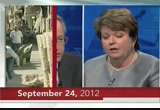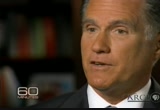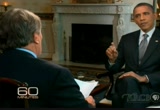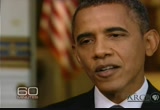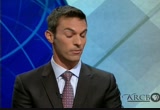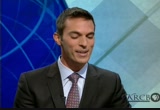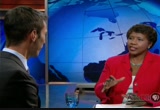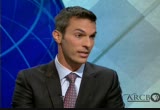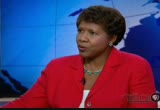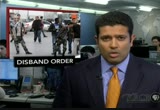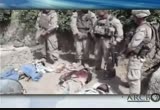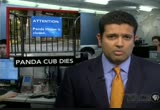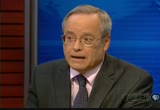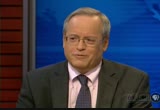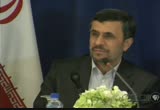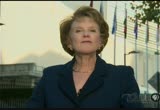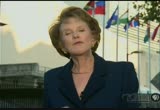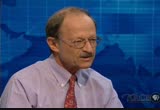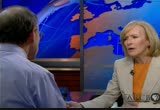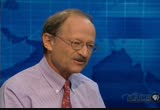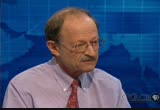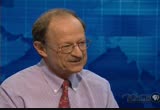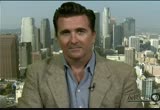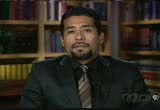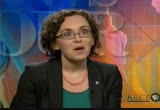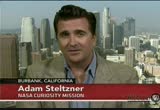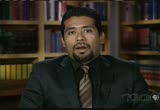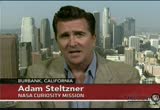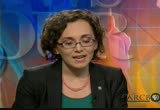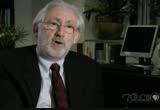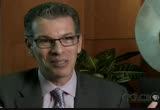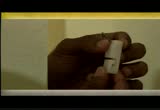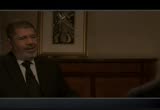tv PBS News Hour PBS September 24, 2012 10:00pm-11:00pm PDT
10:00 pm
the strategy behind the message. >> woodruff: then, from syria, bill neely reports on the stalemate in the city of homs, as government troops target rebel bastions. >> one-and-a-half years after it began and the battle for this city and for syria grinds on relentlessly. the bombardment of hommes. the war here is as intense as ever. >> ifill: as world leaders gather in new york for the annual meeting of the united nations general assembly. margaret warner gives us a preview. >> woodruff: will new genetic findings reshape the treatment of breast cancer? we ask dr. harold varmus, head of the national cancer institute. >> ifill: and ray suarez kicks off american graduate week with a conversation with three now- successful people who know exactly what it's like to want to drop out of high school. >> sometimes we give up on kids too soon. sometimes we want to teach to the test instead of teaching to
10:01 pm
transform. sometimes that comes from top-down policies. >> ifill: that's all ahead on tonight's newshour. major funding for the pbs newshour has been provided by: soon computing intelligence in unexpected places will change our lives in truly profound ways. technology can provide customized experiences tailored to individual consumer preferences. igniting a world of possibilities from the inside out, sponsoring tomorrow starts today. >> bnsf railway.
10:02 pm
and with the ongoing support of these institutions and foundations. and... this program was made possible by the corporation for public broadcasting. and by contributions toour pbs station from ewerlikeou. thank you. >> ifill: the presidential candidates looked to score points today on jobs, taxes, and foreign policy issues with their first of three debates looming next week. president obama was off the campaign trail today, traveling to new york for the united nations general assembly. while mitt romney was on the stump for a second day in colorado. >> what a pueblo, colorado, welcome. thank you so much. >> ifill: romney kicks off a bus tour in ohio tomorrow where he'll be greeted by a new obama television ad. >> mitt romney attacked 47% of americans who pay no income tax,
10:03 pm
including veterans, elderly, the disabled. >> ifill: but the romney camp is also on the offensive. >> fewer americans are working today than when president obama took office. it doesn't have to be this way. if obama would stand up to china. >> ifill: with its own tv ad charging obama is weak on trade against china. ovthe weekend both candidates used dueling interviews on cbs's "60 minutes" to make their case. romney was pressed to provide specifics on economic policy. >> well, i can tell them specifically what my policy looks like. i will not raise taxes on middle-income folks. i will not lower the share of taxes paid by high-income individuals. and i will make sure that wee bring down rates, we limit deductions and exemptions so we can keep the code and we encourage growth in jobs. >> and the devil is in the details though. what are we talking about'? the mortgage deduction? the charitable deduction. >> the devil is in the details. the angell is in the policy
10:04 pm
which is creating more jobs. >> you have heard the criticism, i'm sure, that your campaign can be vague about things. i wonder if this isn't precisely one of those things. >> it's very much consistent with my experience as a governor. which is if you want to work together with people across the aisle, you lay out your principles and your policy. you work together with them. but you don't hand them a complete document and say, here, take this or leave it. look, leadership is not a take it or leave it thing we'vseen too much of that in washington. >> ifill: the president was asked how he could solve economic problems in a second term that he could not get congress to agree to in his first. >> i take full responsibility for everything that we do, steve. and the fact of the matter is, what we've done has been effective in improving the situation in every area that we're talking about. when i made a decision to save the auto industry, that saved a million jobs. one in eight jobs in ohio is dependent on the auto industry.
10:05 pm
so we've actually seen success. >> how are you going to get the republicans to agree to a tax increase for the top 2%? you've been trying for a year. you haven't been able to do it. and you'vate got a majority of republicans in congress, including governor romney, who has signed a pledge never to increase taxes under any circumstances. how are you going to get them to change their minds and make this deal? >> i won't get them to make them change their minds. the american people will. >> ifill: the interviews offered a preview of the arguments each candidate will make when they meet in the first of three presidential debates now just eight days away. for now, the fight to persuade waiverring voters is happening on the air. nationally political ad spending is double what it was four years ago. at this point in 2008, general election ad spending totaled $183 million. for the same time period this
10:06 pm
year, the number is $395 million. the jump in spending is even more drastic in critical battle groun states. like new hampshire where candidates are spending 223% more than they did in 2008. in north carolina, it's 195% more. in virginia, 143%. and in colorado, ad spending has jumped by 146%. there's more. in seven days >> ifill: and the's more. isevedays, from september 13 to september 19, the romney campaign spent $425,000 in battleground colorado on 1,283 ads. the obama campaign spent $1.1 million on 2,891 ads. that's statewide. narrow the focus to one city, colorado springs, and the change is even more dramatic. at this time four years ago, 519 presidential campaign ads had aired in this top ten ad market. this year, the number jumped to
10:07 pm
1,445. the newshour is partnering with kantar media/cmag and npr to keep track of all that spending. npr reporter ari shapiro spent the past week in colorado springs watching those television ads and talking to the voters who consume them. he joins us now. 395 million dollars. let's start with that number, ari. what is that all being spent on really? >> tv stations have a limited number of minutes for advertising. so you are seeing more ads per hour and you're seeing ads in different shows where you didn't used to. you know, game shows, soap operas, reality tv programming where you used to only see the ads in the news programs. you're also seeing the rates for the ads go up and up and up because the real estate is limited and because there's a smaller number of swing states in play, more money from both the campaigns and the outside groups is being concentrated into a much smaller area. >> ifill: how did colorado springs become a target in a war like this? >> republicans outnumber democrats there two to one.
10:08 pm
this is a city where barack obama lost by 19 points to john mccain. whether you carry a swing state or not depends more than whether you carry a town or not. it's cheaper to advertise in colorado springs than it is in a place by denver. losing by five fewer points in colorado springs is as useful to barack obama as winning by five more points in denver. >> ifill: you're spending time on the ground in colorado springs. you're taking like water from a fire hose. you're taking the intake here. what do voters who live there who are getting this kind of assault, what do they say? >> they hate it. i spoke to a romney volunteer who phone banks. he's he makes more than 300 calls. he's happy to call a home during the dinner hour but he's driven nuts by these ads. you can't stand watching them. the ads are not designed for him. something close to 95% of voters have made up their mind. the ads are designed for the 5% or so of voters who are still undecided. if you can get all but 5% of
10:09 pm
people to throw their remote control to the tv screen and the 5% pay attention and you win them over that may be worth the millions of dollars these campaigns are spending. >> ifill: doesn't it matter where these ads are positive or negative, with a are we talking about here? >> colorado springs last week there were 1500 ads broadcast. out of those 1,500 ads, according to c-mag, 50 were positive. >> ifill: that's it? 3 #-rs% of the ads were positive. all the rest were negative. >> ifill: underlying this negative ad strategy, the expensive and quantity ad strategy, what are the messages say that the romney campaign is trying to meun ict. >> they're really different strategies between the romney and obama campaign. mitt romney campaign is using a broad "i will create jobs. i will fix the economy "message but the obama campaign is using much more targeted here's my message to women, to latinos, to seniors, to veterans and students. we see a lot more obama advertising on cable channels
10:10 pm
because they tend to be more targeted to a specific audience whether it's lifetime for women, spike tv for young men. >> ifill: in a state like colorado and a market like colorado springs when you watch these ads, who is being targeted the most? the gender gap. >> the demate karates are trying to hard to exploit the democrat. they won the senate seat in colorado just barely by getting the widest gender gap of any senate race in the country. they're trying to do the same thing in colonel ol in 2012. you also do see an appeal to veterans, an appeal to seniors, an appeal to latinos and so on. >> ifillcolorado springs is also military town. >> big military town, the air force academy is there. >> ifill: that is part of what the targeting is about. assuming you spent time on the ground talking to actual people, the elusive undecided voters. did you find any? >> i did. what was interesting was this one woman in particular who i spoke to said she was a small business owner and a woman. she said she was an obama '08 voter. this time he's undecided.
10:11 pm
she spoke to exactly what the campaigns are saying in these ads. she said as a small business owner, i feel like the democrats want to get in my business. as a woman i feel like the republicans want to get all up in my business. she couldn't make up her mind. clearly the message of the democrats, speaking to her as a woman and the message of the republicans speaking to her as a small business owner in this economy were both resonating with her. she couldn't decide who to go with. >> ifill: i wonder at this point in the campaign whether people who say they're undecided are going to vote at all. did you get the sense that people who said they hadn't made up their minds yet were going to show up? >> people in colorado are very engaged. even if they hate the ads and even if they are overwhelmed by the negativity of this and turned off i got the sense that people appreciate how important this is. at least the ones i talked to all sounded as though they were going to show up and go to the polls. >> ifill: they just can't wait for it to end. >> exactly. ifill: thank you so much. good to talk to you. ifill: you can find a behind-the-scenes look at ari's >> ifill: you can find a behind
10:12 pm
the scenes look at ari's reporting, more interviews with voters, and take a look at the ads on our web site. >> woodruff: coming up, we'll explore how the ad campaigns fit into the wider messages the candidates are using around the country. also ahead, the assault on the city of homs in syria; the coming meeting of the u.n. general assembly; a genetic breakthrough for breast cancer; and three personal takes on the dropout crisis. but first, the other news of the day. here's hari sreenivasan. >> sreenivasan: the backlash against islamist militias in libya gained momentum today. the military named army officers to replace the heads of two of the most powerful militias. that followed the fatal assault on the u.s. consulate there that killed the american ambassador. on sunday, libyan president mohammed el-megaref ordered all militias to obey the government or disband. in egypt today, 14 members of an extremist group were sentenced to death by hanging. the men were convicted in attacks on a police station and bank in the sinai peninsula in june of 2011. six of the men were present for sentencing but eight others were
10:13 pm
tried in absentia and remain fugitives. a former police chief at the heart of a major political scandal in china is facing 15 years in prison. that sentence was imposed today on wang lijun for trying to defect to the u.s., and helping cover up the murder of a british businessman. wang apologized for his crimes today in court. i truly express my repentance to the court for the criminal behavior in the law that i broke. i will pay off the pity and hurt that i caused throughout the rest of my life to the people and the party that care about me. for now i can only sincerely say that i'm sorry, i'm truly sorry i let you down. >> sreenivasan: the wang case led to the downfall of his former boss bo xilai, a once- powerful communist party leader. he is still under investigation. bo's wife, gu kailai, was given a suspended death sentence last month for the murder of the british businessman. the taiwanese company that makes apple's iphones halted
10:14 pm
production today at a chinese factory after a brawl overnight. it involved up to 2,000 employees at the foxconn plant in taiyuan. some of them said it started after a security guard roughed up a worker. in the past year, foxconn has come under scrutiny for alleged labor abuses. the company said production at the plant would resume tomorrow. it employs more than a million workers worldwide. two u.s. marines will be court- martialed on charges they urinated on the bodies of taliban fighters in afghanistan last year. images of the incident surfaced in january, touching off a wave of afghan anger and violence directed at u.s. troops. both of the suspects are staff sergeants. in addition to them, three enlisted marines have already been given lesser punishment. the government of iran has blocked unfettered access to google, and it is switching the country to a domestic internet network. the announcement means google's search engine and g-mail service will be filtered. an iranian news agency reported the move was connected to that anti-islamic film that was
10:15 pm
posted on google's you tube site. on wall street today, stocks struggled to find momentum, and ended up losing ground. the dow jones industrial average was down 20 points to close below 13,59. the nasdaq fell 19 points to close at 3160. the national zoo in washington searched today for answers after a six-day-old panda cub died sunday. zoo officials reported the cub had liver abnormalities and fluid in its abdomen. but the exact cause of death won't be confirmed for two weeks. the cub is believed to have been female. it was the first giant panda born at the zoo since 2005. those are some of the day's major stories. now, back to judy. >> woodruff: and we return to the presidential campaign and examine what the candidates must do between now and the first debate. for that we're joined by our regular duo, stuart rothenberg of the "rothenberg political report" and "roll" call and susan page, washington bureau chief of "u.s.a. today." good to have you both again with us. i want to ask you about the broader campaign but, stu, first let me ask you about what we
10:16 pm
just heard at the top of the show about these ads. all this money that the campaigns are throwing into advertising, do they feel that it's paying off? >> i think they feel they have to do it. i think they both think it's an opportunity to reach voters who are undecided or weak partisans, weak supporters of the other person. but, judy, they've been doing this for months. they've been advertising for months. they haven't moved a lot of numbers recently. i think there's some question how effective the ads are. having said that, there's one other thing to consider. it's the content itself. ari talked a lot about the dollars behind, the number of ads that are running. i think a good ad, an interesting ad, a novel ad that is communicating new information, that might move some voters. the same messages over and over again i'm skeptical. >> i think definitely a point of diminishing returns on these ads though. you have to have ads up but if one candidate or the other has $10 million or $100 million more ads i'm not sure that makes a difference unlike a congressional race. presidential races get so much
10:17 pm
coverage by news organizations that i think these paid ads matter less. >> woodruff: are you two really saying though that all that money, tens of millions and hundreds of millions of dollars going into advertising may not be paying off for them? >> i think they think they have to do it. >> yeah. if on other guy is going to run a bunch of ads you want to run a bunch of ads too. i don't think in a presidential race that's this close and six weeks out that the ads are going to decide this election. the debates are much more likely to be decisive turning points and yet another flood of negative ads. >> look at what everybody talks about. people don't stop on the street talking about the ads that are running. they talk about the news that occurs when mitt romney says something or u.s. ambassador is killed in the middle east. that's what is... that's what creates, i think, opinion by the average voter. >> woodruff: yet the obama campaign talks about all the advertising over the summer defining mitt romney in a
10:18 pm
negative way. >> there was something to be said for the early advertising before romney responded. if you have within uncandidate on the air at heavy levels and another candidate that's not on or is on at much lighter levels i think early on that can happen in fact. >> while the obama campaign has had a big advantage in advertising they advertised early and during the conventions which the romney campaign didn't do, it's still almost a tied race. we've seen the ra shift just a bit in obama's direction but it's not as though it's a run-away race on either side. >> woodruff: here we are 42, 4 days out. susan, is what you think almost a tied race? >> i think it's actually... it's been a tied race a very close race for so long i do think in the past two weeks we've seen it move just bit in president obama's direction especially in some of these swing states like ohio and iowa and new hampshire and virginia. we have statewide polls that show not a big edge for president obama but a pretty consistent one for him. you know, there's a history to this. in the last 15 elections, the candidate who is ahead at the
10:19 pm
point has won the popular vote every time. at this point, president obama has a narrow national lead but a national lead. >> woodruff: how do you see it? i agree. i think we went from a jump ball three weeks now to a slight advantage for the president. i really think it's coming out of the convention. the democrats got a very small bump among a very little sliver of the electorate, but i think that matters. if you compare the august and september nbc news wall street journal poll, the right direction number is up 7. obama job approval is up 2. on the ballot the president is up 2. people are somewhat more upbeat. i think the race has shifted very slightly but in a case like this where it's so close a slight shift can be a significant one. >> woodruff: is that, susan, shifting what the romney camp has to do at this point? >> i think it is. i think that's one reason these debates become so important. before debates usually both campaigns talk about how terrible their guy is at debating and what a master debater the other guy is to try to set expectations.
10:20 pm
that is not what you see happening now. the obama people are talking about what a good debater governor romney is, but the romney people are talking about a good debater governor romney is. that is because they need to reassure their supporters that this race isn't over. it's still close. he can turn it around and the debates will be an opportunity to do this. >> woodruff: this is a different period of expectation setting, stu, than what we normally see. >> a little bit. i think susan is exactly right. i saw robert gibbs on television a couple days ago. he was talking about mitt romney has debated so much times and the president hasn't debated in four years. i think they are trying to lower expectations but you don't hear that same thing from the roey camp. some of this is a need, a desire, to create some momentum on the part of the challenger when there is, you know, so much finger pointing mostly by conservatives and republicans complaining about the romney campaign. >> woodruff: and there's been a fair amount of that. stu, what about in terms of setting the table for substance in are there things the candidates are talking about at
10:21 pm
this point to lay the groundwork for the debates? >> well, romney is beginning this bus tour when he's going to be trying to get the discussion back to jobs and theconomy and the president's performance. and trying to create some momentum, a sense that they turned the corner, that the last two weeks were bumpy but now they're back on message. >> yeah, i think they're trying to do that. there have been calls for governor romney to be more specific and actually for president obama to do so as well. in the interview with 60 minutes you didn't hear him adding a lot of specifics on even something as fundamental as his tax proposals. >> woodruff: can they get away with that? can they continue both of them not to be more specific? >> i guess we'll find out. (laughing). >> woodruff: in the debates. e'll find out in the debate and in the election. >> woodruff: susan page, stu rothenberg, thank you both. >> thank you.
10:22 pm
>> ifill: and we turn to syria, spiraling deeper into civil war. peace envoy lakhdar brahimi briefed the u.n. security council today for the first time since taking on his post. he said the situation is "bad and getting worse." we have an on-the-ground look at the conflict from bill neely of independent television news. he reports from the city of homs. reporter: he is ready to kill. a syrian army sniper aims through a crack in the wall. this is the hidden front line. from their firing point, they target rebel positions just 50 yards away. every day men die here. this is homs, the heart of the war, and here it is. the streets here are so deadly, we move through holes in walls and houses up to near darkness and another sniper. he waits in total silence.
10:23 pm
(gunfire). it's never quiet for long. these syrian troops are trying to take back whole districts the rebels have held for months. they are edgy. the rebels killed five of their men just hours earlier. in homs they run for their lives and we do too. they've been doing it for longer than they ever expected. why is the war lasting so long? >> it will be continuing months, today, one year. we don't know. we don't know. i'm ready to die. for syria. one-and-a-half years after it began and the battle for this city and for syria grinds on relentlessly. the bombardment of homs, the war here, is as intense as ever. these soldiers say they have the rebels trapped in this area and that the battle will be over
10:24 pm
soon. whole neighborhoods here are a wasteland. the signs of battle on every building. few civilians remain. it's almost a shock to see them. in your heart when you see your area like this. >> i can't imagine. i feel very sorry for what has happened. >> reporter: how long will this go on here? >> i don't know. god only knows. god alone knows. >> reporter: the war here is almost macabre, bizarrely a mannequin marks the deadliest junction. but few places here are safe for anyone. so as world leaders of the united nations begin to talk again of syria, dead locked in disagreement, the snipers on
10:25 pm
both sides take their positions. death on their minds. victory in their sights. >> syria will again be one of the dominating issues at the united nations this week as leaders and high ranking officials from more than 120 countries descend on new york for the general assembly debate. one of them, iran's president mahmoud ahmadinejad met with reporters this morning, including our margaret warner. he was asked if he would regard an attack by israel on iran's military or nuclear facilities as an attack by the united states. >> fundamentally we do not take seriously the threats of an attack on iran by them even though we are iran. iran at the end of the day is a great country. let me assure you we do have all defensive means at our disposal. >> prime minister netanyahu has said that israel simply cannot
10:26 pm
stand to have iran to get to the point where it has enough enriched uranium to be able to very quickly convert that to weapons grade and really essentially from a weaon in a matter of months. he's made it clear that israel is prepared to take military action to try to prevent that. do you think he's bluffing? >> you see, whether he's bluffing or he really intends that does not even come into the equation. for us. what are these scientists? put a world map in front of you. put an at last in front of you. iran has been iran for the last 7,000-10,000 years. they have been occupying those territories for the last 60 to 70 years with the support and force of the westerners. they have no roots there in history.
10:27 pm
>> ifill: i'm joined by margaret warner who is at the u.n. this afternoon. margaret, that breakfast looks very interesting. how different was ahmadinejad than what you remember the last time you saw him in action? >> warner: gwen, he was very different. the last time i saw him up close like that was actually 2006 in tehran. he was facing similar pressure which was a u.n. deadline to freeze uranium enrichment or face sanctions. he sood in front of more than 100 reporters for an hour-and-a-half or two. he was combative. he was feisty. he seemed to enjoy jousting with all of us and with the iranian reporters. he smiled a lot. just cocky. today he went an hour-and-a-half nearly but he sat hunched in front of a microphone and seemed very subdued. and barely made icon tact. rarely smiled. even though his words, i would say, were defiept, you heard them on the tape we just ran, he
10:28 pm
really... they it's important to remember he is a lame duck president. his influence appears to have been greatly diminished since seven years ago. >> ifill: one of the big questions which comes up in a recurring fashion here in washington and around the world is about iran's nuclear program. lately benjamin netanyahu has been laying down, drawing another line in the sand on this issue. did ahmadinej appear to be responding to that anyway? >> only because he was asked and pressed by all of us. again, as you saw on the tape he was very dismissive not only of that but also of other pressures on him. for instance, as for the ever-tightening economic sanctions, he said, "oh, iranians are getting used to living without all of that revenue from oil." but on the netanyahu threat, he basically said, as you heard, that he didn't take it seriously. he went on to say that everyone
10:29 pm
should remember that iran is a vast country. he must have used the word "vast" four or five times, as if to emphasize that israelis -- and he didn't mention americans -- would have a hard time taking out all the nuclear facilities even if a strike were to occur. finally interestingly he did not answer a question as to whether he would regard an israeli strike as also being a u.s. strike. whether he would essentially retaliate. other members of his regime have said that frequently but he did not repeat that snep which of course is the big question. the u.n. general assembly always has a public agenda and has what everybody is really talking about. what are people really talking about so far? >> warner: , well what they're really talking about, i have to say at first is syria. the conflict in syria. the unhappiness here with the fact that the u.n. has not done anything about the conflict in syria. but the iranian conflict or stand-off is also a big topic of discussion not only among the
10:30 pm
free israel, iran and the u.s. with their allies but also all of the nerve... of other countries of nervous neighbors. then of course iran's role in syria is part of the whole back drop. i mean, iran stands accused and there's evidence that they've been shipping certainly materiale and supplies if not weapons to the iranians. members of the regime have boasted having iranians there on the ground advising syrian army forces. so iran and what iran is up to is very much on people's minds here. >> ifill: president obama arrived at the u.n. general assembly today. he didn't have anything public on his schedule. what has he been up to? >> warner: not much here at the u.n., gwen, despite all of the international crises, not only iran and syria but the anti-american outburst, violence in the middle east. he is not meeting at all one on one with any leaders, we're told. he declined, as we know, to meet
10:31 pm
with prime minister netanyahu who doesn't get here until thursday. he denieded the request to meet with the new egyptian president mohammed morsi an and the presit of pakistan and the president of libya. again where these anti-american outbursts have taken place. those have been left to hillary clinton, the secretary of state, to handle. she had a couple of those today. the reason really is the election campaign. and white house advisors will tell you that pretty frankly in private. it's not just the time requiredded for the meetings but it's all the time required for the prepare for the meetings. in other words, it's not just the two days. you really have to have something to say when you go on those meetings. you have to know where you are and what you get out of them. there was also just the unpredictability. you've got not only the fact that we're less than 50 days away from the election but the debate next week. the president wants to stay focused on that. these one-on-ones, the president
10:32 pm
and the leader come out and say something to the press. they just couldn't be sure whether it was one of these arab presidents, whether it was prime minister netanyahu who has very bad personal chemistry with president obama that they might not say something that then the white house would have to spend a couple days reactingo. too risky. >> ifill: margaret warner, thanks a lot. >> warner: thank you, gwen. margaret writes more online where we have additional video clips of the iranian leaders. for that and more on what's happening at the u.n. general assembly this week, go to our world page. >> woodruff: next, new research that's changing our understanding of cancer. scientists say they have found new insights into four genetically distinct types of breast cancer, potentially altering the way doctors one day treat the disease.
10:33 pm
part of a comprehensive genetic analysis of breast cancer. among other discoveries, researchers say that a rare but deadly form of breast cancer bears a genetic resemblance to the kinds of tumors found in lung and ovarian cancers. doctors also learned that the two most common forms of breast cancer, both of which rely on estrogen to fuel their growth and have been similarly in the past, are actually genetically distinct from one another. for more on this, i'm joined by dr. harold varmus. he's director of the national cancer institute. the institute has helped to lead the work as part of a larger project to map genetic changes in cancer. dr. varmus, thank you for being here. >> my pleasure. woodruff: tell us what is significant about what you found about these four types of breast can iser. >> these four types have actually been known for some time based on work done nearly a decade ago that was intent on characterizing which genes were off and on in breast cancer types. to the surprise of many, it was
10:34 pm
possible to form four large groups that most breast cancers could fit into. what these studies show -- and they are part of a much larger effort that the cancer institute and the human genome institute are carrying out on many different types of cancer -- is that by using a variety of new techniques to sequence the genome and count the number of copies of genes, to look at which genes are being read out and which proteins are being made that we can look at the heterogeneousity of the cancer of these four groups and find certain commonalities within the groups that give us some insight into which therapies are more appropriate and which kind of new therapies might be envisioned. >> woodruff: is this telling you the genetic markings are more important than just about any other distinction to these breast cancers? we mentioned... >> in general, all cancers have been traditionally characterized by the way they appear under the microscope and the organs in which they arise. as we learn more and more about cancer of every type including
10:35 pm
breast what we learn is that the drivers of cancer are mainly mutations and changes in chromosome organization or numbers of copies of genes. and that those are the instruments that drive a cancer and become ways of categorizing cancer, ways of designing new therapies that specifically target those changes and markers for knowing whether or not these cancers will respond to conventional existing therapies. >> woodruff: was this a shocking piece of information? >> it wasn't shocking, no. we've been going through many kinds of cancers and many more are to come. within this large study. what we're trying to do is create a wear how, a compendium of information. the project is called the cancer genome atlas. it's a warehouse, a storehouse, a database which everyone is free to lookate at because all this information is being made publicly available. you go to our website and look at the cancer genome atlas,
10:36 pm
you'll see the information. you can follow these papers. they're freely accessible to everyone. the point is that we know that every time we approach a cancer with these technologies and look at many hundreds of individual cancers of a certain traditional grouping like pancreatic cancer or liver cancer or gastric cancer or breast and other cancers that have been published, that we're going to see interesting patterns. every cancer looks different. every cancer has similarities to other cancers. we're trying to milk those differences and similarities to do a better job of predicting how things are going to work out and making new drugs. >> woodruff: and how will that affect the treatment of these cancers? i mean, do you alread know how that might happen or is that just... >> we have an idea. first of all, there is the long-range view that as we understand exactly what's wrong, you will make targeted therapies that are specific for cancers
10:37 pm
that have certain kinds of genetic aberrations. but even in the more immediate future, it's going to be possible to put together our understanding, our description of the genetic changes in a cancer and the responses to existing therapies. and that's the piece that we still mis one way in which i believe that patients who have cancer now and are being treatedded now can make a major contribution to the development of more effective and more accurate treatment using existing therapy. >> woodruff: you're saying this could make a difference in the very near future? >> next two years. of it won't change practice overnight. some of the ideas that are in this paper, the connection you mentioned between some of the genetic changes seen in a certain particularly severe from a breast cancer and ovarian cancer, for example, suggest that those cancers have an instability in their genome that
10:38 pm
can be addressed with some existing therapies. those therapies are being tested now in those breast cancer patients. but what remains to be figured out is how we get the clinical information together with the genetic information in the kind of database we can all use to begin to predict who is going to respond to which... >> woodruff: why is that as hard as it is? what would make that easy. >> in part because it's hard to get the clinical information into a form that n be put into a database that is interpretable. some of this is a matter of learning how to massage the data so we make the correlations that are truly helpful. the second is that we need to overcome a reluctance to provide personal, clinical information and genetic information to a database that will help others, to provide the right kinds of concert forms and privacy protections that allow this all to happen. i would urge patients who have cancer now to think of themselves as information donors
10:39 pm
who can benefit not just others who have cancer later but themselves over the next few years because cancer patients are living longer and better lives, thanks to better symptom control, more effective therapies and a deeper understanding of cancer that has come about because of research over the last decades. >> woodruff: what are your hopes for this larger genetic study of all kinds of cancer. >> i believe we are going to have a much deeper appreciation of what kinds of abnormalities in cancer cells and in the surrounding cells that feed and respond to cancers, the vulnerabilities that will allow us to make better predictions of which kinds of drugs will work to treat these cancers. they also become markers that allow or enable early detection. they become sign posts for thinking about what the environmental causes of cancer might be and for thinking about how we can prevent cancers more effectively. this is not just all about
10:40 pm
treatment. we need to think imaginatively about how we prevent cancer which is the ultimate goal. >> woodruff: must be very exciting for you. >> it's a difficult problem that we think we're making great progress against these days. it is an affirmation of the importance of medical research to the nation. >> woodruff: dr. harold varmus, we thank you very much for being here. >> pleasure. thank you. >> ifill: finally tonight, america's dropout crisis. each year, approximately one million students drop out of high school. that's roughly 7,000 every day. tonight the newshour kicks off "american graduate week," where we'll go inside the nation's classrooms to examine some of the causes and some of the solutions. ray suarez has more. >> suarez: in addition to those who leave school without a diploma, there are millions more who are underperformers, failing classes, and falling behind. what happens when students drop
10:41 pm
out? our american... are american schools any good at providing a flexible path to graduation for those who have already checkd out? are schools doing enough to grab kids with potential before failure and negative reinforcement leads them to drop out? my guests' lives and work makes them unusually qualified to tackle those questions. stephanie krauss is a former dropout who runs an education institution in st. louis which operates a charter high school for high-risk students. adam stelts er i a nasa enginee. he helped design the landing for the curiosity mission to mars but once came close to dropping out of high school himself. we profile professor victor rees, a former gang member and high school dropout who now studies young men like himself. he teaches sociology at the university of california santa barbara. professor rees, if you failed classes, if you've missed credits, do we set too high a bar in america to graduate?
10:42 pm
do schools make it too tough to get back on track? >> i think so. ray, i think that what happens is that sometimes we give up on kids too soon. sometimes we want to teach to the test instead of teaching to transform. and sometimes that comes from top-down poly. so on the ground level, educators are trying genuinely to help young people out but sometimes they're forced to live by the standards of the test versus living by the standards of supporting young people's development. so what happened in my story was that i had a teacher, miss flora russ that helped me to change my life around by teaching me to transform my life around through emotional support, social support and linking me with mentors along the way. >> suarez: stephanie krauss, you've designed a program to reach kids like yourself. what do you have to keep in
10:43 pm
mind? >> to the credit question in the state of missouri one of the things that we're really concerned about is something we call seat time. so in order to get one unit of credit when 24 units are required to graduate you have to get a passing grade and then be in class for 7,830 minutes. so if you have a story like mine, i left school and was what you would call chronically truant for a while. so i had a couple of jobs and i was goofing around with the wrong group of friends. i wasn't acquiring credit. i wasn't at school. so my education was disrupted. when i was still high school agedded, if i had returned i would have been too old with too few credits. this is what we're seeing all over the city of st. louis. these young people who are 17 or 18 years old and they need 24 units of credit. they only have 22 or sometimes they only have 3 or 4. so the math doesn't work out.
10:44 pm
what we're trying to do is come up with what we call a competency based apreach. kids get credit when they show us that they know it. flexible paths for them to acquire credit. to show us proficiency. do they know what you need to know in order to go on to college? so that you can succeed in work in life. >> suarez: adam stelts er in, you didn't drop out but to hear you tell it, you might as well have. you were checked out even if your body was getting that seat time. >> yes, but i came close to not passing through the same time of seat time requirement in the state of california when i was there. i agree with both victor and stephanie that looking at the student and as opposed to a set of formulas is really the way to stem tide of kids not graduating. >> you heard the professor say it was one particular caring teacher who helped him turn it
10:45 pm
around. what worked with you? >> well, for me what it was was seeing a couple of my friends not graduate. and the challenge that they had and how they suffered. that kicked me in the hind very late as i got close to graduation and i really knuckled down and was able to make it through. >> suarez: what are the impediments to reconnecting kids with school? do they have to spend some time in the wilderness and realize how hard it is on the outside before they realize, oh, i've got to get back there? >> that's a great question. it depends on who the student is. but we're seeing a couple of trends with our work on the ground in st. louis. so often i use the comparison with alcoholism with addiction. and this idea that there are, in fact, smart kids who leave school because life happened. they get pushed or pulled out. and they've got to go through some of that life.
10:46 pm
essentially bottom out in order to have a real invested interest themselves in returning. so at cheerwater we run our flagship program. it's a charter high school. what we find in terms of stickiness, kids who come and stay and do the hard work of reengaging and moving toward graduation, that they made the decision themselves. many of them young parents. many of them coming off the streets from homelessness or in foster care. often they have that support of a... supportive adult, but they have the agency and the decision to return. we call that grit. it's kind of that persistent passion of wanting it for themselves that is born out of a little failure and a little hardship and a lot of survival and resilience. >> suarez: professor rees your academic work takes a look at high school kids and what keeps them in and out. a lot of them don't even know why they're in school, do they? >> well, sometimes purpose is
10:47 pm
very important. so if we don't have purpose, if we're not teaching young people what the purpose of school is, then they'll think of school and college as this very abstract planet kind of idea. i know there's maybe a 10th planet out there. but i've never really learned about it. it's such an abstract cncept sometimes. so college becomes abstract for young people oftentimes. it's a matter of providing concrete opportunities, persistent care, persistent programming that teaches them. unfortunately sometimes young people that come from poverty don't have those parents that are examples that have gone to a four-year university, let's say. and so because of that i think it's our obligation as a society to provide role models that have gone to fourear universities who an teach a more concrete example of what it means to go to college. so mentoring is is key here.
10:48 pm
>> suarez: i've spoken to a lot of teachers over the last year. high school teachers say one of the most critical moments is when they sit down with a kid with their transcript and say, you can't finish this year. you can't graduate with your friends. we don't have much of a safety net for those kids. how do we keep them engaged? >> that's right. i think it's very hard. i know from my own experience through high school, you can feel in a big high school like no one is really seeing you. no one really is caring about you, the student. you're occupying a spot in a class. you're either there or you're not. that's the challenge because when you feel seen by the institution, by the... by a person at least one, it's a strong pull. start to feel they're on your side. >> suarez: stephanie krauss, we are right now in the midst of a
10:49 pm
standards revolution. everybody wants to make sure high school graduates meet the highest standard. we're in the middle of a numbers revolution where we want to get those graduation rates higher and higher and higher. are those two things warring against each other? how do we maintain standards and get the graduation number up? >> both are critical. i want to take a minute just to highlight the really incredible work that is going on in the city of st. louis. i think that there is a collective effort to come up around this idea of how does a community surround its kids to get the number up and to make sure within that space of numbers our graduates truly are ready for education past high school. so a part of those two things not warring is common vision and common ground around what does it mean for our kids to reengage? and what does it mean for them to be successful? what do we want for them out of being contributing citizens? i think that is a... a key piece
10:50 pm
of that, a driver, is understanding that while dropping out is something that has affected kids in communities for years that this is a community-wide issue like it's never been before. with the markets and the jobs being different, it becomes imperative. educators have cared about educating kids to the standards, to the standard of what it will take to be successful. but marrying it with the graduation rates and lowering our dropout rates means understanding the implications for the job markets. kids have to be proficient in more academic areas than ever before. because e demands look different than they have ever before. that common understanding changes the landscape. st. louis is a great example of a city that gets that. >> suarez: stephanie krauss, victor rees, adam stelts er in, thank you all. >> thank you.
10:51 pm
suarez: across the u.s. there are programs that are working in this regard. keeping kids in school and changing their lives forever. find some examples on my blog post online and our american graduate series continues all week. stay with us. >> woodruff: finally, a new documentary about specific decisions in medical treatment and how they are fueling health care costs in america. that's the subject of "money and medicine" which premieres on pbs stations tomorrow night. much of the film compares the way that two big medical centers, the u.c.l.a. system in los angeles and the intermountain system in utah, approach treatments and testing. here's a short excerpt, looking at the question of when a cat scan may be necessary or not. >> the spine.
10:52 pm
excellent. you can see here are the c.t. images and this is a person's brain who is 24 years old. >> reporter: if someone is worried about the possibility that he's sustained an important injury to his head, the only way to know for sure is to do a cat scan. seems reasonable. and then it comes out normal, we all feel better. it sounds like that's a good deal but it's not a good deal actually for anybody and most particularly not for that patient. why is that? well, there are many many reasons. one is that most of the time, almost always, i can tell clinically whether he has an important head injury. the right test is usually put in the eyes of an experienced physician on a patient. >> we would call this normal. we're going to give his head a clean bill of health. >> reporter: the cat scan itself is is not benign. we know for sure that doing a cat scan, which is about 200 to 500 chest x-rays in terms of
10:53 pm
radiation, that's a lot of radiation, will cause cancer. the estimate is that tens of thousands of cancer deaths are being caused each year by medical radiation. >> not doing the scan and missing that one out of a thousand is a big problem and the medical legal responsibility of now experts saying, well, in this case you should certainly done a scan. why didn't you do one? it gets you into the defensive medicine mode. i'm a parent of two teenagers. i want a clean bill of health. that's my little girl. are you sure there's nothing you're missing? i can't be 100% sure. i can tell you the neuro logic exam was normal. there's a 1 in 5,000 chance that there could be a small bleed that i'm missing. well, yeah, i want the test. >> woodruff: online, ray suarez has an interview with the
10:54 pm
director and producer of the documentary. money and medicine airs on pbs stations tomorrow night. again, the major developments of the day. president obama and mitt romney intensified their attacks on each other over foreign policy, the economy and taxes as they count down to their first debate. deep deen told reporters in new york that israel has no roots in the middle east and would be eliminated. his comments came ahead of the annual united nations general assembly session. and the backlash against extremists in libya gained momentum, as the army named two officers to replace the heads of two of the most powerful islamist militias. online we feature the work of a veteran recently recognized for his poetry. hari sreenivasan explains. >> sreenivasan: earlier this month, army veteran hugh martin won a new literary prize from the "iowa review" in a contest open only to active duty military personnel and veterans. hear him read his poem "intravenous" on art beat. and our partners at global post report from a hospital in battle-torn aleppo, syria. a warning: that video may be disturbing to some viewers. all that and more is on our web site, newshour.pbs.org. gwen?
10:55 pm
>> ifill: and that's the newshour for tonight. on tuesday, paul solman examines why applying for jobs online often doesn't work. i'm gwen ifill. >> and i'm judy woodruff. we'll see you on-line, and again here tomorrow evening, thank you and good night. major funding for the pbs newshour has been provided by: and with the ongoing support of these institutions and foundations. and... this program was made possible by the corporation for public broadcasting. and by contributions to your pbs station from viewers like you. thank you. captioning sponsored by macneil/lehrer productions
10:57 pm
are you totally unprepared? just about l of us have something hangen our walls, pictures, paintings, art work clocks, all can come crashing down and create broken glass. inexpensive picture hook can secure pictures to the wall and help keep you and your family safe. for more information on earthquake preparedness,
10:59 pm
>> rose: welcome to the program. to want, a conversation with mohamed morsi, the president of egypt. >> ( translated ): what happened in cairo was not something that was directed, aimed at the u.s. embassy as an attack, however, the u.s. embassy represents a symbol for the egyptians to express their-- they did not accept what happened from some of the citizens of the united states who offended
174 Views
IN COLLECTIONS
KRCB (PBS) Television Archive
Television Archive  Television Archive News Search Service
Television Archive News Search Service 
Uploaded by TV Archive on

 Live Music Archive
Live Music Archive Librivox Free Audio
Librivox Free Audio Metropolitan Museum
Metropolitan Museum Cleveland Museum of Art
Cleveland Museum of Art Internet Arcade
Internet Arcade Console Living Room
Console Living Room Books to Borrow
Books to Borrow Open Library
Open Library TV News
TV News Understanding 9/11
Understanding 9/11